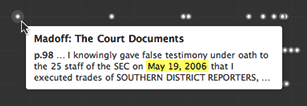Know more about your documents.
 sourceAFRICA runs every document you upload through
Thomson Reuters OpenCalais, giving you access to extensive information about the people, places and organizations
mentioned in each.
sourceAFRICA runs every document you upload through
Thomson Reuters OpenCalais, giving you access to extensive information about the people, places and organizations
mentioned in each.
 Reveal all the dates mentioned in a set of documents, and plot them on a
timeline. Zoom in to view just the few critical months or days. Discover
documents related to your story and explore links to the original reporting.
Reveal all the dates mentioned in a set of documents, and plot them on a
timeline. Zoom in to view just the few critical months or days. Discover
documents related to your story and explore links to the original reporting.
Highlight what matters.
 Annotate documents to highlight key passages. Use public notes to compose
annotations that will be part of your published reporting, and private
notes to organize your own thoughts. Every note has a unique URL, so you can
point readers right to the passage you want to highlight.
Annotate documents to highlight key passages. Use public notes to compose
annotations that will be part of your published reporting, and private
notes to organize your own thoughts. Every note has a unique URL, so you can
point readers right to the passage you want to highlight.
When St. Louis Public Radio published
thousands
of pages of grand jury testimony, forensic reports and other documents related
to the death of Michael Brown in Ferguson, Mo., they served their audience by
identifying passages containing key eyewitness accounts.
Share your work.
 Everything you upload to sourceAFRICA stays private until you're ready
to make it public, but once you decide to publish, your documents
join more than one million other primary source documents in our
public catalog.
Use our document viewer to
embed documents on your own website
and introduce your audience to the larger paper trail behind your story.
Everything you upload to sourceAFRICA stays private until you're ready
to make it public, but once you decide to publish, your documents
join more than one million other primary source documents in our
public catalog.
Use our document viewer to
embed documents on your own website
and introduce your audience to the larger paper trail behind your story.
From our catalog, reporters and the public alike can find your documents
and follow links back to your reporting. sourceAFRICA contains
court filings, hearing transcripts, testimony, legislation, reports,
memos, meeting minutes, and correspondence. See what's
already in our catalog.
Make your documents part of the cloud.
 Headlines
Headlines